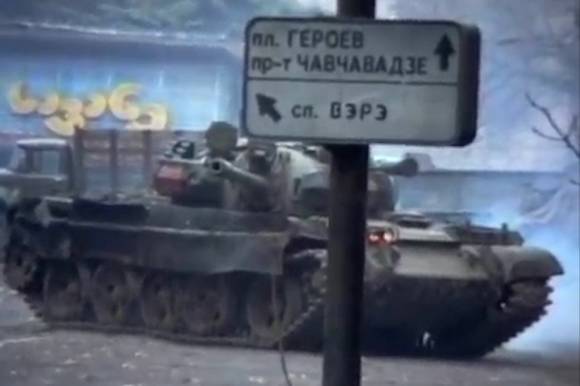Tbilisi Civil War is about modernity, about the problem that was defined in our society by this war and continues to this day. The recent history of Georgia has developed so quickly and radically that the analysis of past political processes has not yet become a priority item on the modern agenda. At the same time, reflecting on the past is an unavoidable necessity, which is a prerequisite for the healthy development of a democratic society.
Archival materials often indirectly and even directly address the role of the big neighbour, Russia, not only as a source of controversy but also as a supplier of arms. Often these themes are reminiscent of conspiracy theories. There is little evidence to support this. Nevertheless, the mirror image of Russia appears again and again in the projections of the film's main characters.
“At the turn of 1991-1992, a confrontation between political forces in the centre of the Georgian capital escalated into an armed conflict. The Tbilisi Civil War ended with the runaway of the first elected president, Zviad Gamsakhurdia, and the transfer of power to a temporary military council. In recent years, a large amount of documentary material depicting this war has been posted on the internet. Bullet supplies aren't enough in the bunker, lots of boxes loaded with weapons are taken out of the Imeli building. Both sides have their own cameraman, their own truth…These shots have a therapeutic function. War-torn citizens in the role of spectators re-experience self-inflicted violence through images, which helps them to understand themselves, to heal their wounds, and to heal themselves. Tbilisi Civil War begs the question: is it possible for a failed revision of Georgia's recent history to be done online today?”, Soso Dumbadze told FNE.
The film, which is fully based on archival materials, is produced by Soso Dumbadze. The project was supported by the Georgian National Film Center (GNFC) with 80,074 GEL / 24,021 EUR in 2021. The authors of the project are open to possible collaborations. The total budget is 107,800 GEL / 32,339 EUR.
Soso Dumbadze is an artist and experimental filmmaker. He is the author of The Parallel (2012), Sunny Night (2017, co-director Lea Hartlaub) and A Yellow Bus (2017). His works have been presented at the Art and Exhibition Hall of the Federal Republic of Germany (the Bundeskunsthalle), Art Cologne, New Talents - Biennale, Künstlerhaus Bethanien Berlin, and others.
Elene Asatiani is a visual storyteller, independent documentary filmmaker and editor. She directed and edited feature and documentary films, including The Way (2015), Gogita’s New Life (2016), Jara (2016), Brighton 4th (2021), Their Valley (2021).
 Production Information:
Production Information:
Producer:
Soso Dumbadze
This email address is being protected from spambots. You need JavaScript enabled to view it.
Credits:
Directors: Soso Dumbadze, Elene Asatiani
Idea: Soso Dumbadze
Editor: Elene Asatiani




















